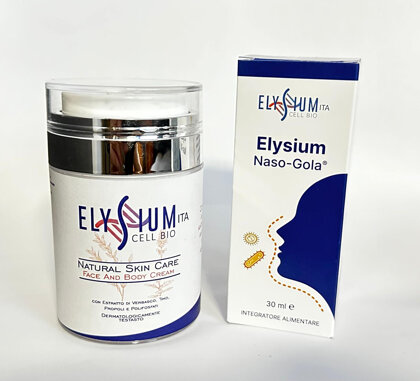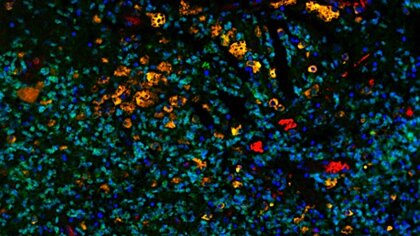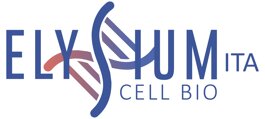ELYSIUM CELL BIO ITA
SOCIAL
INDIRIZZO


via Gaetano Salvatore, 486
Napoli
80145
Italia
Presso CEINGE Biotecnologie Avanzate Franco Salvatore scarl
P.I. 10204541212
CANCRO
Elysium Cell Bio ITA è focalizzata su studi traslazionali (in vitro e in vivo) su tumori cerebrali metastatici e tumori al seno (ad esempio, rispettivamente Medulloblastoma e Carcinoma Mammario Triplo Negativo) studiando quei cambiamenti che avvengono all'interno del microambiente tumorale che influenzano il metabolismo cellulare a seguito dell'applicazione di nuove piccole molecole in grado di inibire l'effetto Warburg e potenziare i benefici immunoterapici.
Terapie
Elysium Cell Bio ITA ha sviluppato molecole non tossiche capaci di colpire Prune1 nelle cellule tumorigeniche aumentando la sua degradazione intracellulare, inibendo così il relativo asse metastatico, riducendo la segnalazione TGF-beta nel microambiente tumorale e influenzando la transizione epitelio-mesenchimale.
Brevetto relativo a questo progetto: Brevetto Europeo 28/10/2022 n. EP22204452, “Inibitori di Prune1 e loro uso terapeutico”.
Riferimenti relativi a questa tematica:
https://pubmed.ncbi.nlm.nih.gov/29490009/; https://www.sciencedirect.com/science/article/pii/S2589004220311354
NUTRACEUTICI
Nutraceutici
Nell'industria farmaceutica, è obbligatorio effettuare test clinici su animali o in vitro per la verifica degli effetti di un composto. Al contrario, in nutrizione, in passato non esisteva un metodo simile per la verifica degli effetti degli alimenti nella prevenzione o nel trattamento delle malattie. Negli ultimi anni, tuttavia, la composizione degli alimenti è stata scientificamente testata e verificata poiché le persone sono sempre più consapevoli delle problematiche legate alla salute e di come il cibo possa essere direttamente o indirettamente responsabile del mantenimento della salute e della prevenzione delle malattie. Questo approccio è seguito da Elysium Cell Bio ITA. Ogni prodotto nutraceutico progettato viene sottoposto a una sperimentazione clinica per dimostrarne la sicurezza e l'efficacia.
o Sviluppo di Elysium "Naso-Gola" Nano-spray e Elysium Nose Throat PLUS soluzione ipertonica per BAMBINI.
Elysium Cell Bio ITA ha sviluppato un nuovo "INTEGRATORE ALIMENTARE" Elysium Nose-Throat è un integratore alimentare a base di Verbasco, Timo, Propoli e Polifosfati. Il prodotto è registrato "COME INTEGRATORE ALIMENTARE" presso il MINISTERO DELLA SALUTE codice N. 163054. Il prodotto è brevettato da Elysium Cell bio ITA srl 80145 – Napoli (n. 102023000016338, agosto 2023; n. 102024000005170, marzo 2024 e domanda di brevetto UE, Brevetto Europeo EP24192124 31/07/2024 "Composizione con attività antivirale, antibatterica e antifungina").
Articolo pubblicato il 17-06-24 su Journal Translational Medicine (BMC- Nature publishing Group).
o Sviluppo di Elysium "Cura naturale della PELLE - CREMA VISO e CORPO
Un nuovo prodotto per combattere i processi infiammatori che si verificano sulla pelle nelle fasi iniziali del cancro (es. basalioma) e nelle dermatiti (es. Psoriasi, Dermatite Atopica e Acne Giovanile). Questo prodotto è ora pronto per il mercato e in vendita dal 1° luglio 2024. I benefici sono descritti nella sezione PRODOTTI del sito web.
o Sviluppo di Immune MAX Biotics una nuova formula contenente Bromelina, Ippocastano, Boswellia, Quercetina, Uncaria, Vitamina C, Propoli, Verbasco e Timo Volgare per combattere le infiammazioni e le infezioni sistemiche e potenziare la risposta immunitaria innata,
Questo prodotto è ora pronto per il mercato e in vendita dal 1° dicembre 2024. I benefici sono descritti nella sezione PRODOTTI del sito web
o Sviluppo di Neuromentis Q10
una nuova formula che consiste nello sviluppo di energia metabolica per il funzionamento neuronale, la protezione neurale e come potente antiossidante. Queste funzioni sono potenziate per migliorare memoria e apprendimento. Adatto durante periodi di stress per ridurre l'ansia e aumentare la concentrazione nelle attività quotidiane che richiedono alta attenzione e memoria. Neuromentis Q10 è un integratore alimentare formulato con Coenzima Q10, Citicolina, Ginkgo Biloba, Quercetina, Astaxantina, vitamine e minerali che agiscono sinergicamente per supportare il benessere cerebrale. I benefici sono descritti nella sezione PRODOTTI del sito web
ELYSIUM CELL BIO ITA
SOCIAL
INDIRIZZO
via Gaetano Salvatore, 486
Napoli
80145
Italia
Presso CEINGE Biotecnologie Avanzate Franco Salvatore scarl
P.I. 10204541212
